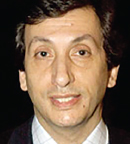
Shaji K. Kumar, MD

Sergio A. Giralt, MD
Two experts in multiple myeloma commented on the EMN02/HO95 MM trial for The ASCO Post: Shaji K. Kumar, MD, Professor of Hematology at the Mayo Clinic, Rochester; and Sergio A. Giralt, MD, Chief of the Adult Bone Marrow Transplant Service at Memorial Sloan Kettering Cancer Center, New York.
Both indicated that although high-dose chemotherapy and autologous stem cell transplant (ASCT) is an important component in managing myeloma, the high response rates achieved with new drug combinations now question its necessity. Both experts also said the European study confirms the results reported at the 2015 ASH Annual Meeting for the French cohort of the IFM/DFCI-2009 trial.1 Also known as the DETERMINATION trial, the study is enrolling 1,300 patients from France and the United States to determine when transplant is best used in newly diagnosed myeloma patients, now that newer therapies are available. Patients are receiving bortezomib (Velcade)/lenalidomide (Revlimid)/dexamethasone (VRD) as initial treatment and lenalidomide as maintenance.
The IFM Trial
Dr. Kumar commented that the EMN study should be interpreted in the context of the IFM trial, which used VRD induction and a VRD consolidation regimen and demonstrated a progression-free survival improvement similar to that seen in the EMN trial, with no overall survival advantage.
“The EMN trial uses a VCD [bortezomib/cyclophosphamide/dexamethasone] induction, commonly used in the U.S., followed by ASCT or VMP [bortezomib/melphalan/prednisone] consolidation,” Dr. Kumar said.
Dr. Giralt added, “Although the induction treatment with bortezomib/cyclophosphamide/dexamethasone [CyBorD] has been shown to be inferior to the combination of a proteasome inhibitor, an immunomodulatory drug, and steroids as induction treatment for patients with symptomatic myeloma who are transplant-eligible, CyBorD as used in this trial is commonly utilized.”
Continued Role of Transplant
Commenting on the EMN study, he reiterated, “With more than 1,000 patients randomized to receive either consolidation high-dose therapy or continued chemotherapy, the transplant arm achieved a significant benefit in regard to progression-free survival. Significant reductions in the risk of disease progression were seen in all disease categories. Moreover, the reduction in risk was seen even beyond the 2-year mark and in patients with high-risk disease.”
“Taken together, the trials support the continued role of autologous stem cell transplant, and we can conclude that neither VRD (a novel agent triplet) nor VMP (alkylator/novel agent triplet) can replace autologous stem cell transplant as initial consolidation,” Dr. Kumar maintained.
“It is also highly relevant that high-risk patients derive the same or more benefit as standard-risk patients and allays concerns that these patients may be harmed by drugs that can further increase genetic instability, such as the alkylators. This trial also asks whether additional consolidation after transplant has a role, and this result will be of great relevance.”
“It is fair to say that autologous stem cell transplant remains an important initial consolidation approach for newly diagnosed myeloma, as shown by improved progression-free survival. Also ASCT can be safely deferred to the second line of therapy if desired without compromising overall survival,” Dr. Kumar concluded. “Given the current debate about cost, it is important to note that ASCT is ‘cost-neutral’ compared with three or four cycles of VRD.”
Dr. Giralt agreed: “Although, as presented, the study does not inform current practice in America, it provides support that high-dose therapy remains the standard of care to which other treatments need to be compared.” ■
Disclosure: Drs. Kumar and Giralt reported no potential conflicts of interest.
Reference
1. Attal M, et al: 2015 ASH Annual Meeting. Abstract 391. Presented December 6, 2015.


